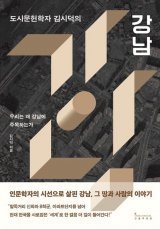New book chronicles gangnam’s rise and growing influence across Korea
New book chronicles gangnam’s rise and growing influence across Korea
Posted May. 03, 2025 07:08,
Updated May. 03, 2025 07:08

A new book traces the past, present, and future of Seoul’s Gangnam district, drawing on the author's four decades of lived experience in the area, alongside government reports and testimonies from urban planners. The author, an urban philologist, paints a sweeping portrait of Gangnam as a microcosm of modern Korean history, marked by a tangle of competing developers, failures, and successes.
Now synonymous with wealth and status, Gangnam's development began with incomplete plans. Initially driven by military and security needs, the government shifted focus in the 1970s toward relocating the capital to the Chungcheong provinces, slowing Gangnam’s growth. In the vacuum, private ambition took over. Corporate tycoons, native farmers, and displaced residents from northern Seoul all flocked to stake a claim.
Ironically, the government’s attempts to stabilize housing prices by building large apartment complexes only fueled demand and drove prices higher. The book argues that Gangnam has grown beyond a single district or real estate market into a powerful social structure shaping Korean society.
The author dissects Gangnam’s transformation in detail, from its rural beginnings to today's skyline of apartments, industries, and transport networks. The book also highlights Gangnam's vulnerability to flooding and sinkholes, a lingering risk from building atop reclaimed lowlands.
Citing the phrase, “Not everyone lives in Gangnam, but everyone is affected by it,” the author notes how the “Gangnam-style” way of life—characterized by apartment complexes, waterfront spaces, and mega shopping malls—has spread nationwide. First seen in Jamsil, this model now defines new towns across Korea. The district’s influence is also expanding southward beyond Seoul, following the semiconductor manufacturing belt through Gyeonggi and into the Chungcheong provinces.
Looking ahead, the author contends that urban development should continue to honor property rights, just as Gangnam's own growth was ultimately fueled not by government direction but by private enterprise and aspiration.
유윤종문화전문기자 gustav@donga.com





![10번 북송된 그녀, 73만 유튜버 되다…탈북 유튜브 ‘유미카’ 뒷이야기[주성하의 북에서 온 이웃]](https://dimg.donga.com/c/138/175/90/1/wps/NEWS/IMAGE/2025/12/12/132938957.1.jpg)

